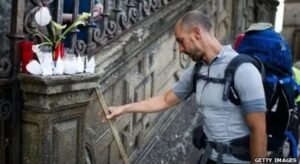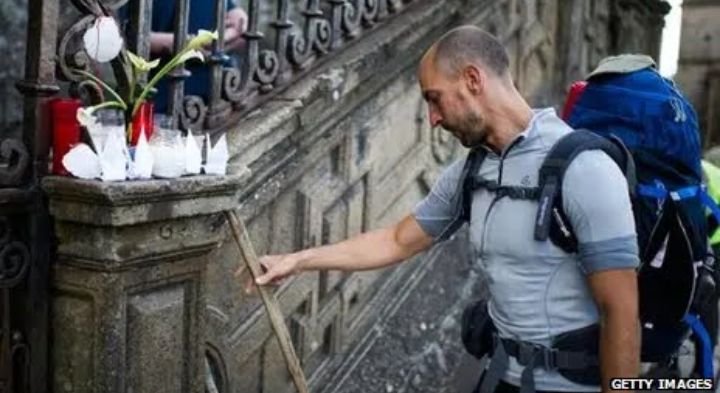Spain shows unity after Santiago de Compostela train tragedy

In Santiago de Compostela, the aftermath of Wednesday’s accident continues to overshadow every aspect of the city’s public life.
At the crash site, officials and emergency workers spent the morning debating the best way to remove the one remaining carriage. Its location, next to a wall supporting a small road bridge, makes its removal even by the giant cranes on site problematic.
Between it and the train’s engine, lying alongside the track 100 metres further on, were seats and other debris from the train’s carriages.
But for many locals and foreign visitors, the main focus has been the historic city centre, where many residents have been setting lit candles at the foot of the steps leading up to the cathedral.
At midday on Friday, Angel Curras, the mayor, joined other local officials for another minute’s silence in front of the cathedral as its bell struck twelve.
It was just one of many held across Galicia and Spain, including in the Spanish parliament.
The silence in Santiago’s main square ended with lengthy applause, with bystanders joining in.
Afterwards, Mr Curras told journalists the condition of the injured still in hospital was evolving “favourably”, saying that eight more people had been released during the morning and that one young girl had left intensive care.
But he said identification of some of the few remaining unidentified bodies would require the use of DNA matching, because they are so badly burned or otherwise damaged.
‘No division’
Meanwhile, travellers of all ages continued to arrive on Friday from all over Spain, Europe and the rest of the world. For them, the joy of reaching Spain’s prime site of pilgrimage – after completing their route of the Camino de Santiago, the Way of St James – was mixed with deep sadness.
Xavi Abade, who arrived around midday on Thursday after cycling almost all the way from Barcelona, said that although he and his fellow riders had heard the news, the magnitude of the disaster did not hit them until they reached the Galician capital.
“On the Camino all the people were talking about that, but we were excited to arrive to Santiago,” Mr Abade told the BBC.
“We arrived – it was happy for us, but we just found this sad feeling. It was really strange.”
Ryan Gordon, from the American city of Portland, had arrived on foot on Wednesday, the eve of St James’s day and the night when most of the planned festivities were to take place.
“We were sitting down up on a hill waiting for the fireworks to happen, and then all of a sudden people started getting up and moving away and we wondered what was going on,” he told the BBC.
“We had to come down into town to find out. It went from being a huge party with everyone in the streets everywhere to just empty,” Mr Gordon added.
For locals, Wednesday’s accident will mark the city’s history forever.
“I think this is the first time that this festival hasn’t been celebrated,” said Maria Almodovar, a journalist with regional daily El Correo Gallego.
“It’s horrible for the city and I don’t think we’ll ever forget it.”
She had been on leave when the news broke but was drafted in to help cover it.
She praised the response of professionals, volunteers and politicians, who have put their differences aside in what she said was admirable fashion.
“The worst is the horror of the tragedy, but the best is the attitude, the solidarity, not just from Galicians – all Spain is with Santiago. Today there is no division.”
